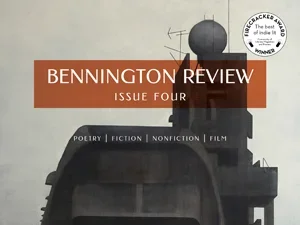Bennington Review, Issue Four: Staying Alive
The newly relaunched Bennington Review has released its fourth issue, featuring innovative poetry, fiction, creative nonfiction, and film writing around the theme of “Staying Alive.”

The issue reprints an extraordinary interview from a 1980 issue of Bennington Review, where David Remnick, presently the longtime editor of The New Yorker, engages in a conversation with the renowned American poet John Ashbery (1926-2017).
The issue also features an essay by the novelist Rick Moody about Thomas Pynchon's classic novel The Crying of Lot 49. Additionally, the issue includes film writing on the revived series Twin Peaks and the contemporary action thriller John Wick; fiction by David Crouse, Susan Daitch, and Ian Stansel; translations of Jorge Luis Borges and the contemporary Chinese poet Ye Hui, and new poems by Kathy Fagan. Andrew Feld, Sarah Gridley, Anna Maria Hong, Phillip Metres, Danielle Pafunda, Eric Pankey, Zachary Schomburg, Sandra Simonds, and numerous others.
In the words of editor and Bennington faculty member Michael Dumanis, Issue Four “represents a tonal shift from the work we had read for our third issue, Threat, which was published in Summer 2017 … The mood of many pieces in Issue Three was somewhat grim, apocalyptic, resigned to our political and cultural realities, suffused with a certain degree of irony, bitterness, inevitablility, and anxiety.
Something has shifted in the cultural landscape. An acceptance of threat has bred a series of reactions—resistance, perseverance, even a measure of optimism. Inside Issue Four of Bennington Review, the situation is no less dire than it was before, but there’s now a restored sense of agency. As this issue’s cover painting by Frank Webster suggests, even the burnt-out desolate landscape in the aftermath of a cataclysm can be a dwelling-place, somebody’s home, a site where survival and possibly renewal can occur. And “Staying Alive,” with all its connotations, including the cheesier pop-music ones, feels particularly appropriate as a lens through which to consider this new writing. Though we may feel under siege, we are still completely capable of dance and song, and have a pretty good chance of making it to the next chapter.”